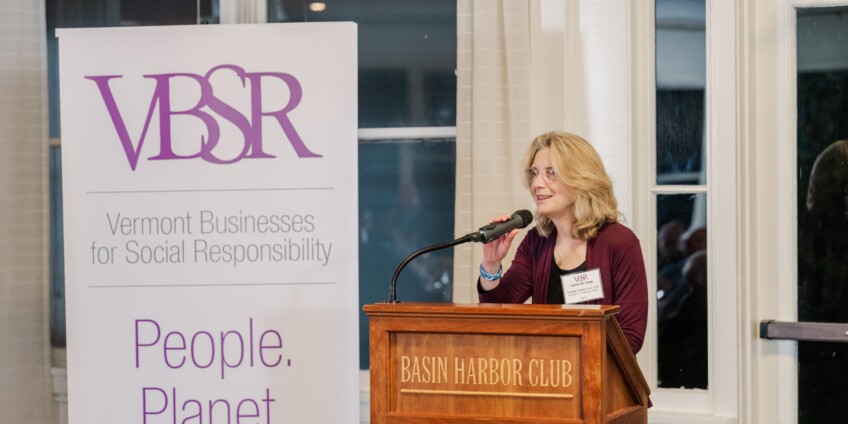An Impact Investor’s Musings: Lessons Learned from a Decade of Investing in Rural Communities

By Janice St. Onge, President, Flexible Capital Fund, L3C
Since 2011 I’ve been running the Flexible Capital Fund, L3C (the Flex Fund), a for-profit, impact investment fund and Community Development Financial Institution (CDFI). The Flex Fund provides flexible, patient risk capital in the form of revenue based financing, debt and equity, to growing companies in Vermont and New England’s food system, forestry and climate change solutions sectors. Since 2011, the Flex Fund has made 45 investments totaling $7.2 million in 24 different companies operating in the sustainable food systems, forest products and climate change solutions sectors.
Structured for Impact
We knew from day one that form must follow function – if we wanted to create impact, our funding needed to be impactful itself. There are three fundamental aspects of the Flexible Capital Fund that enabled us to center our mission. The Flex Fund is a women-led and run fund. Considering 95.1% of venture capital partners in the U.S. are male, it’s perhaps not surprising that women entrepreneurs receive less than 3% of VC funding. We must diversify fund managers to diversify companies and the economy. It’s not easy trying to change the status quo. The Flex Fund is a not a venture capital fund, but we often get lumped into the category.
We are proud to be a certified CDFI. CDFIs are lenders and investors with a mission to provide fair, responsible financing to rural, urban, indigenous, and other communities that mainstream finance doesn’t traditionally reach. Where others see risk, we see opportunity. Through this designation, we have a responsibility to invest at least 60% of our fund into under-invested communities. With CDFI funding, we can also pair our investment with technical assistance for our entrepreneurs to support their success.
We are the only CDFI (and the only fund) in New England with a focus on revenue-based financing (RBF) as an alternative to equity investment. RBF stands out as an innovative and mutually beneficial approach for companies, investors, employees, and the communities where they operate. This unique financing model creates a collaborative ecosystem that fosters growth, sustainability, and prosperity. RBF loans don’t have an interest rate, and that repayment is based on a percentage of revenue over time and our returns are really a function of the time value of money. Our capital is less expensive than equity, and more expensive than bank debt – which has primary claim to a company’s assets if they can’t pay the loan back from cash flow. But with RBF loans, we don’t always require personal guarantees or collateral, payments are flexible and based on percentage of revenue vs. a fixed principal and interest payment, and we don’t ask for dilution of ownership or decision making. This makes RBF financing a great alternative to equity for growing rural businesses that will never be high enough growth or margins for angel investors or venture capitalists, which is essentially the majority of companies in rural New England.
Let’s Retire Drivers of Wealth Inequality, Discrimination, and Isolation
Despite our use of innovative and non-extractive financing options for growing mission-focused businesses, the fundamentals of our financial system remain the same. There are some things about the system that are just broken, like the need to grow for growth sakes; investors’ focus on short term versus long term results; and the fact that the system doesn’t take into account the costs of our human impact on the planet. It’s time to retire some of the things that perpetuate wealth inequality, discrimination, and isolation and look toward a system where we can meet the needs of all people within the means of the living planet.
One Impact Investor’s Recipe for Funding a Better Future
Here are some key takeaways from our journey and our vision for the next 12 years:
- We Invest in People, Not Just Companies: It’s the dedication of entrepreneurs and their teams that drives success.
- Relationships Matter: We’re more than a checkbook; we prioritize values and alignment.
- Look Beyond Financial Returns: We consider social and environmental impacts alongside profits.
- Sustainable Growth Over Endless Expansion: It’s about quality over quantity, thriving economies over endless growth.
- Promote Diversity in Investing and Entrepreneurship: Diverse teams lead to better outcomes.
- Small Investments, Big Impact: Small actions collectively lead to significant systemic change.
- Local Initiatives, National Impact: Regional investments can have a wide-reaching influence.
- Surround Yourself with Mission-Aligned Experts: Having the right people makes a difference.
- Learning from Failure and Empathy: Failure is part of growth; treating others with respect is essential.
- Prioritize Mental Health: Empathy and support are vital for entrepreneurs’ well-being.
- Importance of Patient Equity Capital: Patient capital is key for flexible, impactful investments.
- Take An Integrated Capital Approach: Use varied resources for holistic growth.
- Unity and Interconnectedness: Collaboration over isolation is the key to success.
- Challenge Failing Systems Collectively: Taking risks to change systems is essential for progress.
- Wealth Transfer and Values-Based Investing: Knowing what your money is doing matters.
I believe in feeding the vision of a better, more equitable future. To learn more about our work and join us in this journey, visit Flexible Capital Fund.
—————————–
Janice St. Onge is President of the Flexible Capital Fund, L3C (“Flex Fund”). Named among the 25 Transformative Funds of 2021, the Flex Fund is an impact investment fund and Community Development Financial Institution (CDFI) providing flexible risk capital (including revenue-based financing, equity and debt) to Vermont’s food system, forest products and climate solutions businesses. As President of the Flex Fund, Janice manages all facets of the Fund’s operations, including raising capital, deal flow, due diligence, and portfolio / financial management. Janice brings economic and business development as well as financial expertise to the organization, having served in the technology, financial services, higher education, and state government sectors during her 40+ year career.